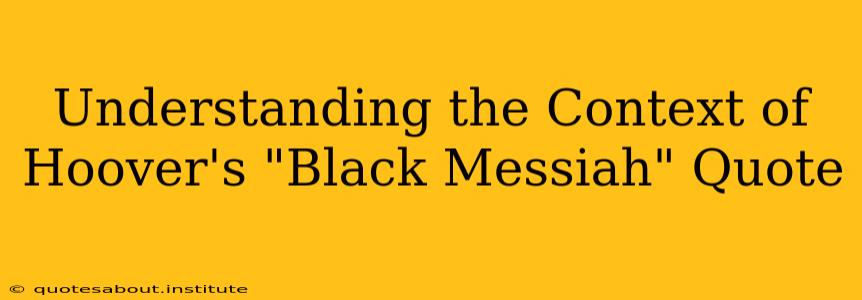J. Edgar Hoover, the long-serving director of the Federal Bureau of Investigation (FBI), is infamous for his controversial statements and actions, particularly regarding civil rights. One quote that continues to spark debate and analysis is his alleged reference to Martin Luther King Jr. as a "Black Messiah." While the exact phrasing and context of this statement remain debated, understanding the historical backdrop is crucial to interpreting its meaning and impact. This exploration will delve into the historical context surrounding the quote, examining Hoover’s complex relationship with King and the broader socio-political climate of the time.
Was Hoover's "Black Messiah" quote accurate?
The precise wording and source of Hoover's supposed "Black Messiah" comment are unclear. There's no definitive record of him using those exact words in an official document or public statement. Many accounts are based on secondhand reports and interpretations of his actions and writings, which frequently expressed deep distrust and suspicion towards King and the civil rights movement. Therefore, the accuracy of the direct quote is questionable. However, the sentiment—that Hoover viewed King as a powerful figure wielding significant influence over the Black community—is widely accepted as reflecting his actual perspective.
What was Hoover's view of Martin Luther King Jr.?
Hoover's attitude towards Martin Luther King Jr. was deeply antagonistic and rooted in a profound distrust of King's methods and motivations. He saw King not as a champion of civil rights but as a potential threat to national security. Hoover's concerns stemmed from a combination of factors:
-
Communist Infiltration Fears: The Cold War paranoia permeated Hoover's thinking. He suspected communist influence within the civil rights movement, seeing King and his associates as potential pawns in a broader communist plot. This suspicion fueled extensive FBI surveillance of King, including wiretaps, infiltration, and attempts to discredit him.
-
King's Charisma and Influence: King’s immense popularity and ability to mobilize massive protests posed a challenge to Hoover’s authority and the established order. Hoover viewed King's influence with a mixture of fear and disdain.
-
The Rise of the Civil Rights Movement: The growing momentum of the civil rights movement presented a direct challenge to the status quo, threatening racial segregation and the power structures Hoover felt compelled to defend.
How did Hoover's views influence FBI actions?
Hoover's negative perception of King directly shaped the FBI's actions. The bureau engaged in extensive surveillance of King, including the infamous COINTELPRO program, which used illegal tactics to disrupt the civil rights movement. These actions aimed to weaken King's influence and portray him in a negative light. The goal was to discredit King's message and minimize the impact of the civil rights movement.
Why is it important to analyze Hoover's perspective?
Analyzing Hoover's perspective, even through the lens of his potentially inaccurate quote, is crucial for understanding the complex history of the Civil Rights Movement. His actions, fueled by his deeply ingrained biases and fears, had a significant impact on the movement's trajectory and its participants. Understanding Hoover's worldview helps us grasp the challenges and obstacles faced by activists during this critical period in American history and illuminates the extent of government overreach and suppression of dissent. It serves as a cautionary tale about the dangers of unchecked power and the importance of critical examination of historical narratives.
What other methods did Hoover use to discredit King?
Beyond surveillance, Hoover and the FBI employed various tactics to undermine King's credibility, including:
- Dissemination of compromising information: The FBI attempted to leak information intended to damage King's reputation, including allegations of infidelity.
- Psychological warfare: The bureau aimed to psychologically destabilize King through harassment and intimidation.
- Attempts to manipulate public perception: The FBI actively tried to shape public opinion by releasing selectively edited information.
Understanding these actions is essential to a comprehensive analysis of the challenges faced by the Civil Rights Movement and the pervasive influence of anti-civil rights sentiment within powerful government institutions. The alleged "Black Messiah" quote, whether literally accurate or not, serves as a potent symbol of Hoover's deep-seated distrust and hostility towards Martin Luther King Jr. and the broader Civil Rights Movement.

